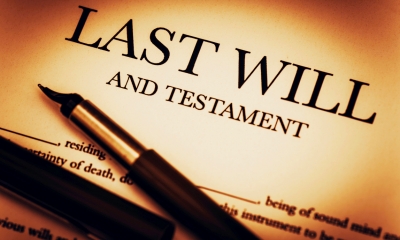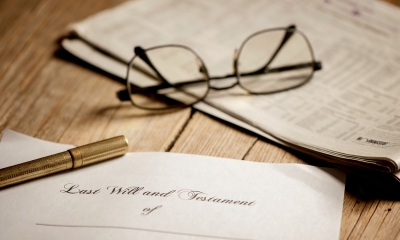
Making a will allows you to plan for what should happen to your assets after your death. By planning in advance, you can establish who you wish to benefit from your estate when you die, minimise any inheritance tax payable and reduce the risk of a dispute. Making a will also gives you the opportunity to express your wishes for your funeral arrangements.
Do you need a will?
If you die without having made a will, your assets are automatically distributed according to the rules of intestacy. The distribution depends on whether you are married (or in a registered civil partnership) and whether you have any children. This may well have undesired consequences:
- Your spouse (or civil partner) does not necessarily receive all of your assets. He or she is only entitled to your personal possessions (eg furniture, cars etc) and the first £270,000 of your other assets plus half of the rest.
- If you own your home in your sole name, or as tenants in common (rather than as joint owners), then your share of the house is included in your estate rather than automatically passing to your spouse. In the worst case, he or she might be forced to move out of the family home.
- If you were in a relationship but not married (nor in a registered civil partnership), your partner may not be entitled to any of your assets at all.
- Part of your estate may be shared out among your children, or other relatives if you have no children - regardless of their financial need or whether you would have wanted to give them anything.
- Other individuals (eg friends) and organisations (eg charities you support) will not receive anything even if you would have liked them to.
- The inheritance tax payable on your estate may be higher than it could have been had you made plans.
There may be further problems if your personal and financial circumstances are complicated: for example, if you are paying maintenance to a former spouse, have assets tied up in the family business, or own assets overseas (eg a holiday home).
Reviewing your assets
Significant assets may include your home, personal possessions (eg cars, furniture, and works of art), savings and investments. In addition, you should take into account any further income or capital that may arise at your death: for example, from life insurance policies or a pension scheme.
A review like this allows you to start planning how you would like your assets to be dealt with. For example, there may be individual assets you want to give to particular individuals. A rough valuation of your overall net assets (after taking into account any significant debts such as a mortgage) also guides you on what your options are: for example, how much (if any) you could give away to other individuals without compromising your spouse’s financial wellbeing.
Keeping a clear written summary of your assets (and debts) will make it easier for your executors to deal with your estate when the time comes. Your records should also include details of any significant gifts you have made, as gifts made in the seven years prior to your death can form part of your estate. A clear distinction should be made between any loans you have made (which should be repaid to your estate on your death) and outright gifts.
Beneficiaries of your estate
If you are married or have a civil partner, your spouse (or partner) is typically the first beneficiary you will want to provide for. You should also take into account any other dependants you may have: for example, children, a former spouse or anyone else you give maintenance payments to. As well as your own wishes to look after them, they may have a legal right to challenge your will if they are not sufficiently provided for.
Other beneficiaries may include relatives, friends, charities and other organisations you would like to make gifts to.
Note that your will can name classes of beneficiary (eg all your grandchildren - including those who may be unborn at the time of writing the will). The will should also take into account what will happen if a beneficiary predeceases you: for example, whether you would want a deceased child’s share of your estate to pass instead to his or her family.
The will should make it clear what is to be given to each beneficiary (or group of beneficiaries), and which gifts take priority if the estate is not large enough to cover all your wishes. Gifts may include:
- Particular assets (eg your house, a valuable picture or jewellery)
- Sums of money (eg the first £100,000 of my estate)
- Any residue after all the other gifts have been made (eg the remainder to be shared in specific proportions among named beneficiaries)
Gifts can be put in trust rather than made outright. For example, you might use a trust to control assets that are being passed to children (or young adults) or to individuals who are incapable of looking after their own financial affairs. A trust may also be an appropriate way of protecting assets (for example, if a beneficiary is at risk of losing assets on divorce) or preserving the family business.
Trusts may also be a useful way of sharing assets between different beneficiaries: for example, allowing your spouse to benefit from the income during his or her lifetime, but leaving the assets to your children when your spouse dies. Trusts like this may also offer inheritance tax advantages.
Other issues your will could cover
Wills commonly include an indication of your wishes for your funeral, though these are not binding on your executors.
You may want to prepare a separate letter of wishes providing guidance for your executors. For example, such guidance might be aimed at helping them understand how you would want different beneficiaries of a trust to be treated. Again, this is not binding on your executors.
Drawing up a will is also a good opportunity to consider other important issues that could arise, and to prepare any appropriate documentation. For example:
- A ‘living will’ setting out what medical treatment you do or do not want to receive if you become incapable in the future.
- A power of attorney giving someone else the power to manage your financial affairs and/or personal welfare if you are no longer capable.
- Appointment of a guardian to look after a child with no surviving parents.
- Ensuring that any company pension schemes have been advised of your wishes if appropriate (eg if you can nominate who will receive any death benefits).
Drafting the will
A will must be in writing and signed. Your signature must be witnessed by two individuals over the age of 18 who are of sound mind and not blind. Witnesses and their spouses cannot benefit from the will.
If there could be any doubt that you are of sound mind at the time of making the will, you should ensure that suitable medical evidence is provided. Otherwise it might be possible for the will to be challenged.
The will should state who will act as your executors, dealing with your estate after your death. You can choose who you like as executors: they should be adult individuals you trust and who are willing to accept the responsibility. It is normal practice to appoint between two and four executors, often family and friends. Solicitors or a bank can also act as executor, but will charge for doing so.
The will should also include a number of clauses dealing with specific issues: for example, specifying that your executors have the right to reimbursement for their expenses in dealing with the estate. Your solicitor can advise you and include these as a matter of course.
You should keep the will, and any related paperwork such as details of your assets, in a safe place - and ensure that your executors know where that is.
Finally, it is worth reviewing your will regularly, particularly if there are changes in your family circumstances (eg marriage, divorce or births), your financial position (eg if you inherit significant assets) or in the law relating to wills and inheritance tax. Your will can be amended as necessary with an appropriate 'codicil', or a new will drawn up and the existing will revoked.
Note: This guidance applies to England and Wales only. Different rules and procedures apply in Scotland and Northern Ireland.



